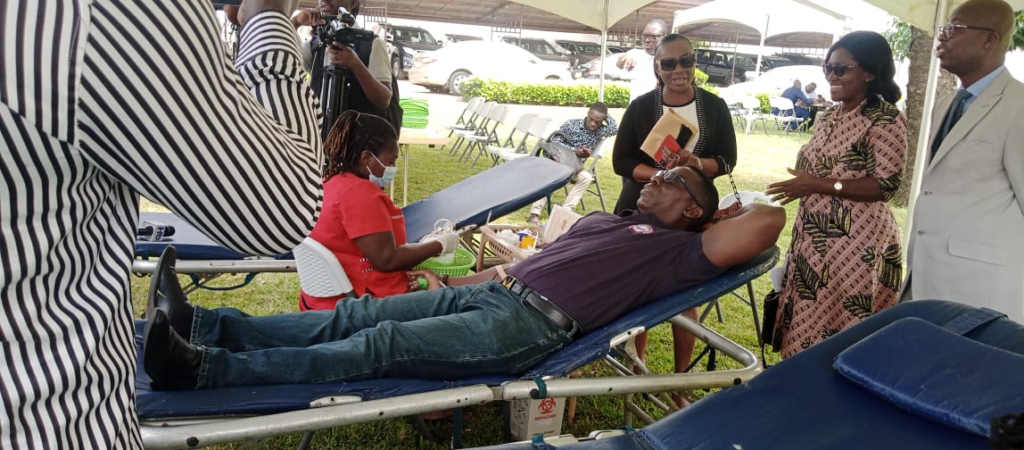The Medical Director and Chief Executive Officer of the Greater Accra Regional Hospital (Ridge), Dr Emmanuel Srofenyoh, has disclosed that the current maternal mortality rate in the country stood at 310 per 100,000 live births.
This, he indicated is above the World Health Organisation (W.H.O) accepted standard of 70 out of 100,000 live births. He said the majority of these deaths are due to bleeding during or after childbirth.
Dr Srofenyoh disclosed this at the launch of the 2022 Ghana Insurance Industry Blood Donation Campaign championed by the National Insurance Commission (NIC), in Accra. He, therefore, appealed to the general public to voluntarily donate blood to help stock the National Blood Bank.
The initiative, which formed part of the Insurance Industry Blood Donation month was on the theme: "Donate Blood, Save a life: as You Do It For Someone, You Do It For Yourself."

Last year, the NIC together with key industry stakeholders - Ghana Insurers Association (GIA), the Insurance Brokers Association of Ghana (IBAG), the Chartered Insurance Institute of Ghana (CIIG), the West Africa Insurance Companies Association (WAICA), the Ghana Insurance College (GIC), the ECOWAS Brown Card Insurance Secretariat, designated the month of August as Ghana Insurance Industry Blood Donation Month during which all players in the insurance industry across the country would be expected to donate blood to help stock the National Blood Bank.
Dr Srofenyoh said though the country needed 310,000 pints of blood annually, the country could only supply 169,000 pints through blood donations and family replacement, leaving a shortfall of 141,000 pints of blood.
The renowned Gynecologist said women in labour, children, trauma and accident victims and cancer patients needed blood to survive.

The Chief Executive Officer of the National Blood Service (NBS), Dr. Shirley Owusu-Ofori, in her remarks said there was a shortfall of blood donors in the country, explaining that although the W.H.O recommended rate for blood adequacy ratio was 10 units per 1000 people, the country had only 5.7 units of 1000 people.
She said per the W.H.O recommendation, if one percent of the country's population donated blood, there would be enough blood at the various hospitals in the country.
According to Dr. Owusu-Ofori, the country needed about 320,000 people, constituting one percent of the population to donate blood, but only about 170,000 donors were donating blood.
However, the Commissioner of Insurance, Dr. Justice Ofori, said the exercise formed part of the Insurance Industry Blood Donation Month, and the commitment of the insurance industry players in the country to save lives.
He said as part of the programme last year, the insurance industry players across the country donated 802 units of blood to help stock the blood banks.
Dr Justice Ofori said this year's blood donation would be carried out throughout the country and the figure is expected to be higher compared to last year’s.
Latest Stories
-
Honda and Nissan hold merger talks
6 minutes -
The city where shopkeepers fear their CCTV cameras could get them killed
20 minutes -
Bawumia to grace Parliament’s Festival of Nine Lessons and Carols
39 minutes -
UK removes nearly 13,500 migrants since election
53 minutes -
Fourteen dead as Vanuatu searches for earthquake survivors
1 hour -
Petrosol’s Energising Dreams Promo: 14 more lucky customers win big in second draw
1 hour -
Gisèle Pelicot: How an ordinary woman shook attitudes to rape in France
2 hours -
Apple accused of using conflict minerals
2 hours -
President-elect Mahama plans to reform cocoa sector, restructure regulator
2 hours -
US singer Chloe Bailey, Burna Boy spotted in Lagos; spark dating rumours
4 hours -
Major power outage hits Kenya, affects internet access
4 hours -
New Mauritian PM sends fresh Chagos proposals to UK
4 hours -
Sensitive data leaked after Namibia ransomware hack
5 hours -
Dozens in Mozambique killed by ‘intense’ cyclone
5 hours -
Canada announces new border rules following Trump tariff threat
5 hours

